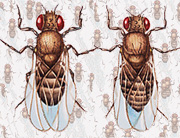

Nature - November 1, 2004
As if there weren't enough of them in the world already, scientists have succeeded in cloning flies. The identical fruit flies are the first insects ever cloned, says the Canadian team that created them. The question everyone asks, says group leader Vett Lloyd of Dalhousie University in Halifax, Nova Scotia, is why anyone would want to clone flies in the first place. She hopes that the insects, which are very easy to experiment with, will help to fine-tune the cloning process in other animals and even in humans, where the technique is being researched to aid production of therapeutic stem cells.
In cloning, the DNA-containing nucleus of an adult cell is injected into an egg whose own nucleus has been removed. At the moment, the majority of cloned mice, sheep and other animals die before birth. It is thought this is because the adult DNA is not properly 'reprogrammed' and cannot orchestrate the growth of an embryo.
Using flies, researchers might reveal genes that are important for this reprogramming, and that have counterparts in other animals. That is because it is relatively easy in flies to knock out the function of a single gene and then attempt cloning with these cells, which will test whether that gene is crucial. If such genes are identified, then in theory cloned mammalian embryos might be grown in tailored solutions that alter the activity of those genes to improve the technique's success rate.
Although some groups have attempted to clone insects before, Lloyd says this is the first time it has been successful. The team used a slight variation on the standard cloning process: they transferred nuclei taken from embryos rather than fully-fledged adult cells. They sucked several nuclei out of developing fly embryos, and injected them into a fertilized fly egg. From over 800 initial attempts, they conjured five adult insects, the group reports in the journal Genetics.
Keith Latham, who studies mouse cloning at Temple University School of Medicine in Philadelphia, Pennsylvania, points out that embryonic cells are much easier to reprogramme than adult cells. "I'm not sure there are many close parallels to what's going on in mammals," he says. Lloyd acknowledges this, and says the group are now working towards creating clones from adult fly cells.